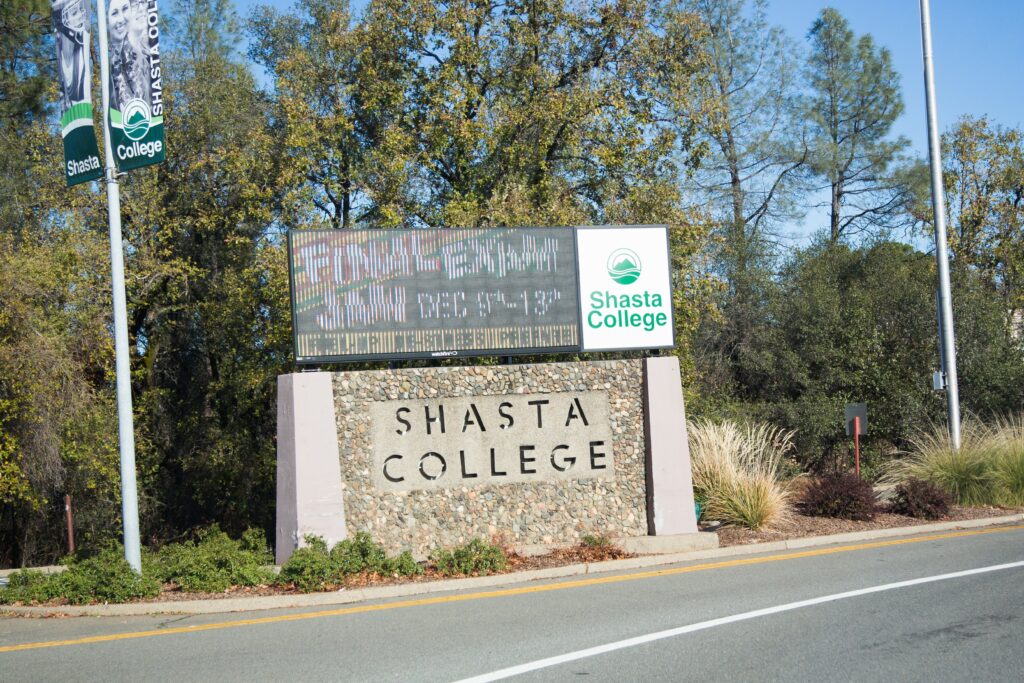
Shasta College’s accelerated college program aims to reach working adults.
Julie Leopo/EdSource
Top Takeaways
California colleges experimenting with short courses report promising results for adults, returners and Black students.
A group of California community colleges plans to launch more compressed eight-week programs in fall 2026.
Accelerated online courses were a boon to one student-parent returning to college after decades out of school.
About a decade ago, Buffy Tanner and her colleagues at Shasta College in Northern California decided to rethink how they reach students who started college but never finished.
The college draws from a region spanning nearly 10,000 square miles across Shasta, Trinity and Tehama counties. Those counties are home to about 55,000 people 25 and older with some college education but no degree, according to census data, fully 30% of the adult population.
“We realized that those students out there were our students that had left us,” said Tanner, the college’s director of innovation and strategic projects. “We weren’t necessarily making it attractive or doable for them to come back as adults.”
So the college created class schedules aimed at fitting the lives of such students, many of whom are working adults and parents. That led to programs that run on eight-week terms instead of the more typical 15-to-18 week semesters. While semesters require full-time students to take four or five courses simultaneously, eight-week terms reshuffle the full-time schedule and require just two compressed courses at once.
“If you are an adult with adult responsibilities — and you are already spinning plates for maintaining your home, supporting your family, working, chauffeuring your kids around to various activities, looking in on your aging parents — you do not have a whole lot of bandwidth for four or five more things,” Tanner said. But, even then, “you might have bandwidth for one or two more things.”
Where are eight-week courses gaining ground?
Eight-week courses have gotten traction at community colleges in states like Virginia, Indiana and Texas, and are gathering momentum in California. Researchers last year published a paper finding that shortened courses have spread in California as educators look for ways to improve enrollment and retention following pandemic-era downturns. Almost a quarter of California community college enrollments in 2021 were in courses lasting less than 10 weeks, researchers found, up from about 15% pre-pandemic.
Colleges like Bakersfield College, Orange Coast College and Long Beach City College are among those experimenting with shorter course lengths. Similar efforts around the state are getting a boost from a project seeking to launch more shortened academic programs at California community colleges in fall 2026 and assess how well they work for students.
Oranit Limmaneeprasert, the president of the Faculty Association of California Community Colleges, said there’s no one-size-fits-all solution. Shortened formats may be perfect for some students and courses, but she worries switching completely to an eight-week calendar would give adult students less flexibility. At American River College in Sacramento, where she teaches English as a second language, a mixture of course lengths, online and in person is already the norm.
That’s one reason why places like Long Beach City College have added more eight-week courses without abandoning conventional semesters. “What we really are trying to do is increase the number of options that students have available,” said O. Lee Douglas, the college’s vice president of academic affairs.
The college credits expanding eight-week classes with boosting its course success rates. It’s also found Black students are disproportionately likely to take a second eight-week course.
How do Shasta College’s accelerated courses work?
Shasta College’s Accelerated College Education (ACE) program today offers 17 associate degrees and eight certificate programs based on eight-week courses. Most are online, but some are hybrid. The programs range from business and psychology degrees to certificates in human services and early childhood education. About 300 students were enrolled as of a recent count, averaging 33 years old.
The compressed design means students can make faster progress toward a degree or certificate, Tanner said. They can also count as full-time students for financial aid purposes if they take four classes total across two consecutive terms.
Among the ACE program’s recent graduates is Jon Amacker, 42. Amacker took his first class at Shasta College while still in high school, but work opportunities drew him away for decades. After a lack of a college education cost him promotions at work, he decided to give Shasta’s ACE program a shot. With dedicated work, he earned an associate of science degree.
The program made “a huge difference, because I’m married, I’ve got two kids,” said Amacker, who now works in student services at Shasta College and is continuing his education in hopes of a career in higher education. “At the end of the day, how much time do I have to dedicate to homework?”
